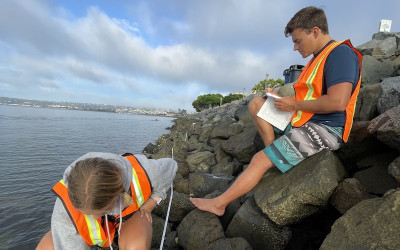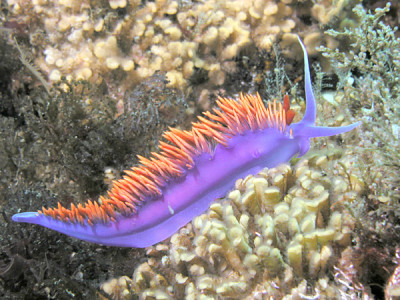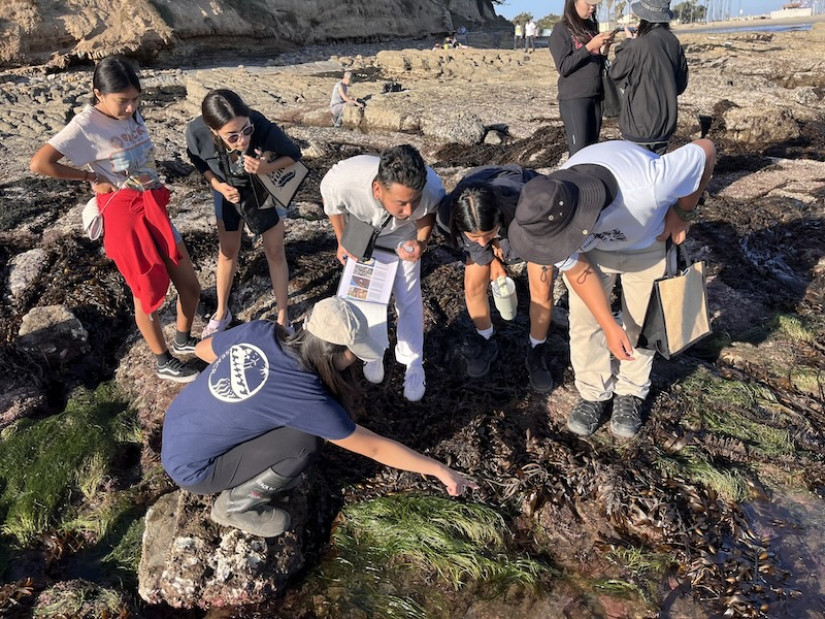Header photo: Anastasia Quintana and students from UCSB’s RISE fellowship.
Cintya Felix perked up when she saw the opportunity advertised in a campus email blast: Richelle Tanner, a professor at her college, Chapman University, was seeking bilingual students who wanted to work on climate advocacy. Tanner was looking for students to lead workshops that would teach Orange County residents how to identify and catalog nudibranchs, a type of colorful mollusk that tends to delight naturalists, professional and amateur both.
Felix worried that as a non-biologist she might not qualify; she’s studying political science. But she soon learned that she fit the mission of this project, which was seeking to attract students who might not otherwise consider marine science fields.
California’s more than thousand-mile-long coastline is home to 40 million people and attracts as many as 100 million visitors annually. As the climate warms and populations grow, its staggeringly diverse array of natural ecosystems and human communities face challenges that we will only be able to overcome with a generation of scientists as diverse as the coast itself. Currently, though, the vast majority of graduates entering the marine science fields are white.
To promote a new inclusive model of undergraduate marine science education, California Sea Grant launched the Pathways to Inclusive Research Training Program in 2023. The $628,000 program funded eight projects that offered students from underrepresented groups opportunities to build skills and community within marine science research. This August, a virtual symposium, including panels featuring funded researchers, will discuss the lessons learned.
“We wanted to give faculty who know and interact with students the opportunity to develop pathways that worked for their communities,” says Shauna Oh, the director of California Sea Grant.
Support through mentorship

Many of the funded programs focused on one key strategy: mentorship, often accomplished by pairing undergraduate students with graduate mentors. One program, at San Diego State University, found success by creating research teams consisting of a community college student, a fourth-year undergraduate and a graduate student mentor. After participating weekly in collaborative research and online trainings for three months, the younger students reported a higher sense of belonging in the sciences.
Similarly, the Center for Diverse Leadership in Science-Ocean Science Learning Ecosystem paired students from the University of California, Los Angeles, and East Los Angeles College, a two-year university. The two students in each pair shared racial identities, which was meant to help the students see themselves in the sciences. Fuyan Shan, a psychology major at East Los Angeles, was attracted by the chance to gain experience as a researcher; the program expanded her sense of science. “It’s not just for scientists,” she says. “Science needs everyone’s contribution.”
At the University of California, Davis, professor of biogeochemistry Alyssa Griffin used the funding to create a “bridge” for students transferring out of two-year community colleges. Transfer students, many of whom had little to no research experience, were paired with faculty and graduate student mentors for several month-long research projects before formally matriculating at UC Davis.

The Marine Science Institute at the University of California, Santa Barbara, launched the Resilient Interdisciplinary Social-Ecological Fellowship, or “RISE.” Anastasia Quintana, a researcher at UCSB, paired four undergraduate students with doctoral student mentors; the undergraduates were drawn from the Promise Scholars program, which supports low-income students at UCSB. The RISE fellowship also offered bi-weekly sessions that focused on team building, how to prepare for graduate school, and scientific storytelling. Friendships flourished, Quintana says, and some of the students continued to work together after the program’s official end. “That kind of relationship can’t be manufactured,” Quintana says. “The program succeeded beyond my wildest expectations.”
Expanding community
It’s not just college science programs that need diversification, notes Richelle Tanner, a professor of environmental science and policy at Chapman University. Nonprofit organizations that seek to influence climate and environmental policy often struggle because the identities of their leadership don’t match the audiences they are trying to reach. So Tanner decided to build a program that would empower undergraduate students and help nonprofits at the same time.
She focused on nudibranchs in part because of their charisma. They’re also a perfect challenge for naturalists: Nudibranchs live in tide pools, a habitat that is accessible — but are masters at hiding amid rocks and seaweed. Based on her research, Tanner also suspects that these species might serve as sentinels — ones that give us warning about future climate impacts.

With the help of Felix and other students, Tanner created hands-on “scavenger hunts” for nudibranchs in Mandarin and Spanish, two common languages in Orange County. Felix herself led some of these community events. Her family emigrated from Tijuana six years ago, and she says in the past she’s been frustrated by their lack of political engagement. The workshop, though, made clear that that was in part because no one had been reaching out. Felix’s mother attended the scavenger hunt that she conducted, in Spanish, which has been transformative.
“Living in the city of Anaheim, she doesn’t often get to experience that she shares the world with animals,” Felix said. Learning how climate change was impacting the nudibranchs made her realize she might be impacted, too. “That down-to-earth interaction was helpful,” Felix says.
Now, her mother is asking for information about upcoming elections, and encouraging Felix’s younger siblings to engage, too. Felix, for her part, was inspired by the experience to study environmental law. Previously, she’d never put much weight on the science part of her political science major. But, she says, “now I realize I am a kind of scientist, too.”
A virtual symposium in August will feature the recipients of California Sea Grant’s Pathways to Inclusive Research Training Program and their projects. The virtual symposium is free to attend and will be held on August 2 and August 15 from 12:00 PM – 1:30 PM PDT via Zoom. Register for the August 2 sessions here and for the August 15 sessions here.